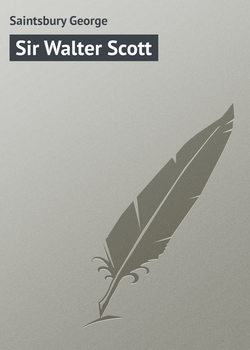Sir Walter Scott

Реклама. ООО «ЛитРес», ИНН: 7719571260.
Оглавление
Saintsbury George. Sir Walter Scott
PREFACE
CHAPTER I. LIFE TILL MARRIAGE
CHAPTER II. EARLY LITERARY WORK
CHAPTER III. THE VERSE ROMANCES
CHAPTER IV. THE NOVELS, FROM WAVERLEY TO REDGAUNTLET
CHAPTER V. THE DOWNFALL OF BALLANTYNE & COMPANY
CHAPTER VI. LAST WORKS AND DAYS
CHAPTER VII. CONCLUSION
Отрывок из книги
Scott's own 'autobiographic fragment,' printed in Lockhart's first volume, has made other accounts of his youth mostly superfluous, even to a day which persists in knowing better about everything and everybody than it or they knew about themselves. No one ever recorded his genealogy more minutely, with greater pride, or with a more saving sense of humour than Sir Walter. He was connected, though remotely, with gentle families on both sides. That is to say, his great-grandfather was son of the Laird of Raeburn, who was grandson of Walter Scott of Harden and the 'Flower of Yarrow.' The great-grandson, 'Beardie,' acquired that cognomen by letting his beard grow like General Dalziel, though for the exile of James II., instead of the death of Charles I. – 'whilk was the waur reason,' as Sir Walter himself might have said.
Beardie's second son, being more thoroughly sickened of the sea in his first voyage than Robinson Crusoe, took to farming and Whiggery, and married the daughter of Haliburton of Newmains – there was also Macdougal and Campbell blood on the spindle side of the older generations of the family. Their eldest son Walter, father of Sir Walter, was born in 1729, and, being bred to the law, became the original, according to undisputed tradition, of the 'Saunders Fairford' of Redgauntlet, the most autobiographical as well as not the least charming of the novels. He married Anne Rutherford, who, through her mother, brought the blood of the Swintons of Swinton to enrich the joint strain; and from her father, a member of a family distinguished in the annals of the University of Edinburgh, may have transmitted some of the love for books which was not the most prominent feature of the other ingredients.
.....
It has been said that he states (with a touch of irony, no doubt) that his heart was 'handsomely pieced'; and it is not against the theory hinted in the foregoing paragraph, but, on the contrary, in favour of it, that the piecing did not take long. In exactly a year Scott became engaged to Miss Charlotte Margaret Carpenter or Charpentier,4 and they were married on Christmas Eve, 1797, at St. Mary's, Carlisle. They had met at Gilsland Spa in the previous July, and the courtship had not taken very long. The lady was of French extraction, had an only brother in the service of the East India Company, and, being an orphan, was the ward of the Marquis of Downshire, – circumstances on which gossips like Hogg made impertinent remarks. It is fair, however, to 'the Shepherd' to say that he speaks enthusiastically both of Mrs. Scott's appearance ('one of the most beautiful and handsome creatures I ever saw in my life'; 'a perfect beauty') and of her character ('she is cradled in my remembrance, and ever shall be, as a sweet, kind, and affectionate creature').5 She was very dark, small, with hair which the Shepherd calls black, Lockhart dark brown; her features not regular, but her complexion, figure, and so forth 'unusually attractive.' Not very much is said about her in any of the authentic accounts, and traditional tittle-tattle may be neglected. She does not seem to have been extremely wise, and was entirely unliterary; but neither of these defects is a causa redhibitionis in marriage; and she was certainly a faithful and affectionate wife. At any rate, Scott made no complaints, if he had any to make, and nearly the most touching passage in the Diary is that written after her death.
The minor incidents, not literary, of his life, between his call to the Bar and his marriage, require a little notice, for they had a very great influence on the character of his future work. His success at the Bar was moderate, but his fees increased steadily if slowly. He defended (unsuccessfully) a Galloway minister who was accused among other counts of 'toying with a sweetie-wife,' and it is interesting to find in his defence some casuistry about ebrius and ebriosus, which reminds one of the Baron of Bradwardine. He took part victoriously in a series of battles with sticks, between Loyalist advocates and writers and Irish Jacobin medical students, in the pit of the Edinburgh theatre during April 1794. In June 1795 he became a curator of the Advocates' Library, and a year later engaged (of course on the loyal side) in another great political 'row,' this time in the streets.
.....